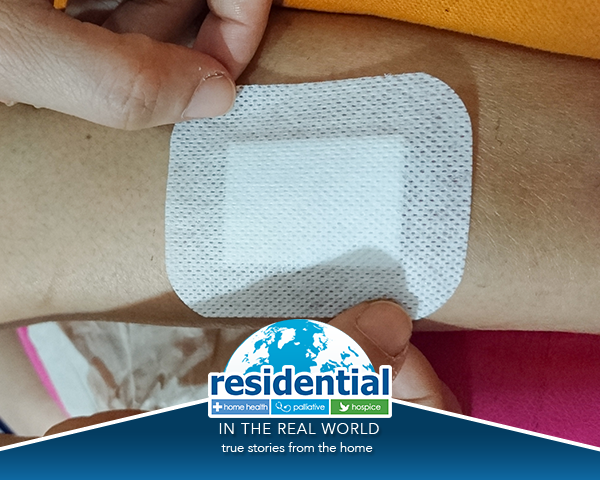 Residential in the Real World
Residential in the Real World
At Residential Home Health, we ask ‘What’s your health challenge?’ because our care is far from one-size-fits-all. Each patient’s health status and history informs what kind of care is appropriate for the situation, whether that be nursing, physical therapy, occupational therapy, medical social work, speech therapy, or often some combination. And beyond these different services, Residential clinicians may have extra training and specialize in a particular area of expertise or proven treatment — for example, certification in the LSVT BIG and LOUD therapies for patients with Parkinson’s or other neurological disorders.
Another area of specialization is wound care; Residential employs nurses who take on extra courses of study and certification and have become experts at wound dressing and healing at home. For one Residential patient, ignoring an injury allowed her wounds to progress and worsen, and more than dressing changes was needed to repair them. Read on to learn how Residential nurse and case manager Jessica combined skilled attention and hands-on care with education and advocacy, easing her patient’s pain and restoring her outlook.
Prepare to Repair
Amanda had bumped her leg while on an airplane, but did not seek care for what she deemed a ‘small’ scratch. Several weeks later, her adult children noticed a foul odor coming from her wounds, which were increasing in size and getting worse instead of better. Amanda’s physician referred her to a wound care clinic, which referred her to a surgeon. Before a skin graft could be placed, however, the surgeon first wanted Amanda’s wounds to be treated for infection and cleared of damaged tissue, so home health care with Residential was ordered.
Education and Encouragement
Over the course of her care, Jessica not only changed Amanda’s wound dressings, but she taught the patient about a variety of topics related to her condition:
- Wound care
- Signs and symptoms of infection
- Need for exercise, given her specific circulation and blood pressure concerns
- Proper nutrition and hydration, to promote wound healing
- Interventions for depression, anxiety, and pain
- Home safety
Amanda did not want physical or occupational therapy, so Jessica encouraged her to participate in a TV ‘chair yoga’ program, which helped decrease stress. She also communicated with Amanda’s sister (who was hosting her), explaining the rationale why Amanda should mostly stay off of her feet and encouraging her to remain positive and supportive through a frustrating recovery period.
Fighting for Pain Relief
When the wound clinic started Amanda on a course of vacuum therapy, the treatment pushed the patient’s pain to levels that were higher than she could tolerate. Despite being mild-mannered and kind, Amanda’s wound dressing changes were so painful they led her to fist-pounding and tears, making Jessica almost want to cry along with her.
Jessica worked with the patient’s physician to increase the dosage of pain medication, and eventually to prescribe a topical gel that finally made the pain more acceptable. She instructed Amanda to take her pain medication 30 – 60 minutes prior to her home health visits; often times, this meant making sure Amanda was the first visit of her day. In one close call, Jessica noticed increased odor, redness, and drainage during a dressing change, and promptly reported the development to the wound clinic, which successfully intervened.
Recovery and Restoration
Once the wounds were ready, Amanda received the skin graft; this was her only hospitalization during her care with Residential. After the surgery, Jessica continued seeing Amanda weekly, doing wraps on her legs in cooperation with the wound clinic’s care. Amanda stopped reporting leg pain, and her remaining pain was controlled with over-the-counter medication and rest. As her outlook improved greatly, she looked forward to moving back to her own home and traveling again to visit her children.
Residential Home Health’s expert services include a number of specialty programs to help you work toward your specific health goals safely at home. Call (888)930-WELL (9355) to discuss your specific situation with a Home Care Specialist today, or click the image below to take our 60-second, 15-question Home Care Assessment.
{{cta(‘3073a01b-4a0b-41c6-91c0-460ecd8e3277’)}}

